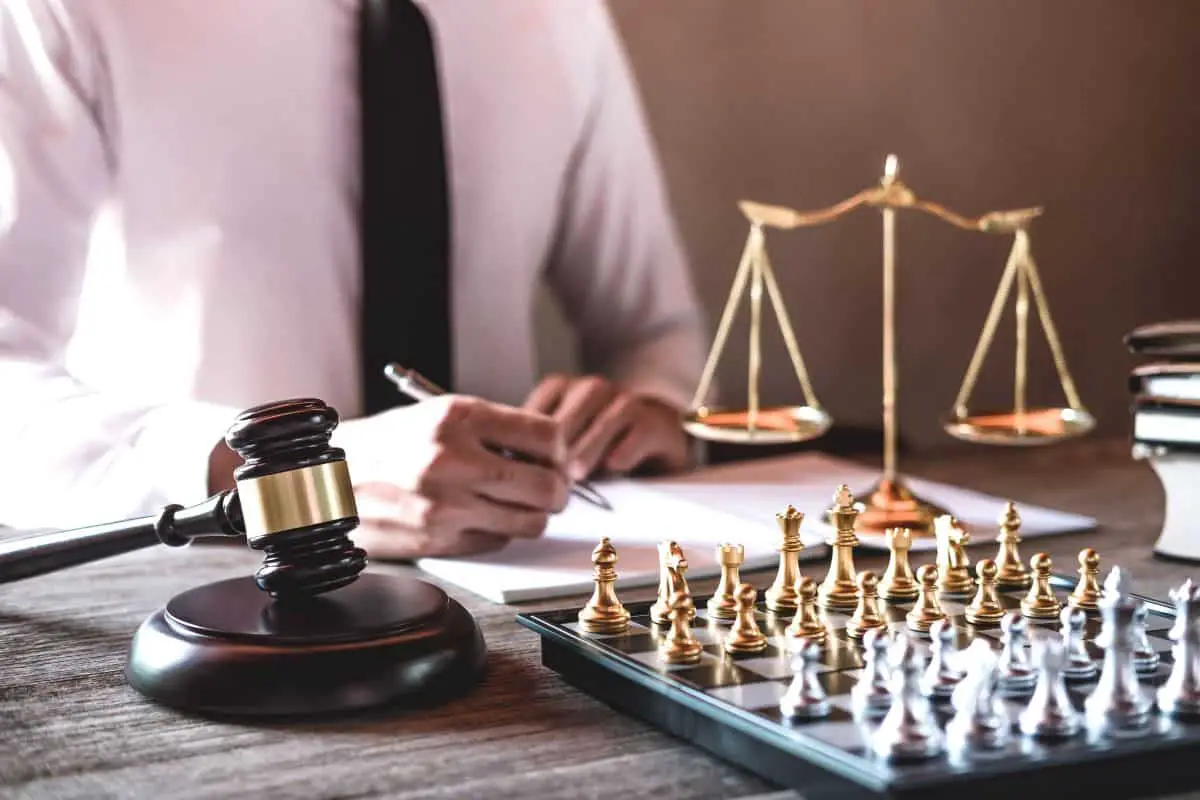
17 Feb 10 Traps Lawyers Use In A Deposition
Common Traps Lawyers Use In Deposition
In the course of a deposition, there are certain traps that lawyers use to turn what appears to be a simple question into an opportunity for their client to “lawyer up” and refuse to answer based on privilege. After some further research on this topic, I have discovered phrases or traps that lawyers use to assist them during depositions.
So, what are the top traps lawyers use in a deposition? The top traps that lawyers use in a deposition are objections, referencing items outside the scope of discovery, discussing privileged information, referring to the past, discussing a situation, asking for a break, asking for further instruction, or refusing a question.
Keep reading to learn more!
 Ten Tricky Phrases Lawyers Can Use In A Deposition
Ten Tricky Phrases Lawyers Can Use In A Deposition
Among tricks that might be used at a deposition – and this list is far from exhaustive:
1. The One-Two Punch
It’s normally the tough questioner who has been playing cat and mouse with the witness who now asks, “Do you have any documents which show your time records for the period in question?” He’s yelling: ‘Yes!” and whipping out his pocket-sized datebook, with its real entries.
An answer is an admission unless it follows the magic words: “That question calls for a legal conclusion” – which will be followed by “I instruct you not to answer until I confer with counsel.” After all that, the lawyer can decide whether or not to answer.
2. Objections
Objections are delays in disguise. It takes time for the witness to hear the question, daydream about what it might mean, look up at his interrogator and ask himself, “What did he say?”
Then he has to wait for the response: “Objection,” after which comes the explanation of why it’s being made – all of which takes time. The late objections are the best.
These are found in documents where they are printed clearly at the foot of each page, under “Exhibit 10A” or whatever. This is especially helpful if you have to go through a long deposition reading them as you go.
3. Read Out of Context
Another trick is to read them not in full but out of context. This you can do by picking the one phrase, the linchpin which holds everything together, and reading that alone without regard to the other phrases which come before or after it.
The opponent has no way of knowing what was said earlier or later on this point. As for documents, the deposition-taker should request the right to read them into the record. It sounds high-handed but it’s not – think of it as reading entire passages which are particularly helpful to you.
4. Not Relevant
“Immaterial!” The magic word is not admissible – use it in the right situation and you’re home free. You won’t get an explanation from opposing counsel unless he’s in a gracious mood.
For the record, “immaterial” means not relevant – that is, not bearing on the issues of the case. The witness should be instructed to answer only those questions which are material to his testimony.
5. No Answer
“I instruct the witness not to answer!” When opposing counsel objects, you can ask him whether he’s objecting on form or substance.
If you’re assured it’s just formed, go ahead and answer the question if one of your objections is sustained. That is unless there is some other reason why you can’t. When you object based on form, they have to rephrase it. That gives you two bites at the apple.
6. No Preparation
“I object because I haven’t had an opportunity to prepare!” This is a common one when documents are being produced for inspection – where there is no chance to go over them before the deposition.
When you hear this, you can normally get away with asking about individual documents or groups of documents – such as all those marked “exhibit 10A” and so on.
7. Continuance
“I object because I’m going to ask for a continuance.“ If they do ask for a continuance, they’ve got to show good cause why they didn’t get it before the deposition.
That could leave them toast if they were out fishing or having fun while you were working on your brief – and will probably cost them money in court costs.
8. Recess
“I move for a recess.” You may grant or deny this request as you see fit. Some lawyers like to grant it automatically; others refuse unless there is a really good reason.
If you are the only one working on your case, it’s often a luxury because you can easily go into another room to finish up papers or look up authorities while they’re out playing or scheming against you.
You don’t need to give them reasons why – but if you do (such as “because I have an appointment with the dentist“), you’ve opened your door a crack.
Once they know your reasons, you’ll have to keep them going over until hell freezes. If they’re planning something and there’s time for it before lunch or quitting time, ask them to get their papers in order so that if you have to go into another room you won’t be interrupted.
9. Directed Verdict
“I move for a directed verdict.” This is only appropriate when they’ve asked for something and you’re entitled to it under the evidence or pleadings, but they haven’t formally requested it themselves.
Don’t use it until you study your case carefully and decide whether this will be beneficial. Then do it right away – before opposing counsel has a chance to figure out what you’re up to.
Sometimes attorneys who are afraid of losing a motion will make it for you. If they do, turn around and say “I object”.
10. Mistrial
“I move for a mistrial.” This is the proper way to raise objections.
Other Tricks Used By Lawyers During Deposition
Here are some other common traps used by lawyers during deposition.
 Objection
Objection
The dreaded “objection“. At its best, this is a routine objection made to preserve the record. (I once saw opposing counsel object to a question as “argumentative” and “irrelevant.” The witness answered anyway, explaining that she might have been “argumentative” but never “irrelevant.”)
Objections at their worst are made for other purposes. For example, an objection can be used to tell a client not to answer a question (because the lawyer knows it is incriminating) or to tell a witness not to answer a question because it calls for privileged information.
Most objections should be treated as “routine,” and the foundation for making them should be laid in advance:
“Your Honor, I would like to take an opportunity to lay a foundation for any objections I may interpose to the questions asked of the witness, and to explain why we believe that certain answers might be privileged.”
Outside Scope of Discovery
When the question calls for information that is outside of the scope of discovery or is otherwise objectionable on its face, an answer may be sought by asking a tightly focused follow-up question.
For example: “You have indicated that you are not aware of any reason why plaintiff would have had any reason to believe that defendant was infringing any of his patents. Are you aware of any reason why the defendant would have had a basis for believing that plaintiff was infringing any of his patents?”
When the question calls for information that is outside of the scope of discovery, or otherwise objectionable on its face, your objection should be to answering the question as asked rather than to the form of the question. For example: “Objection, calls for information outside the scope of discovery.”
“I object to your questioning my client about other lawsuits he has been involved in.”
The objection should be limited to answering as to past lawsuits and/or settlement negotiations because those matters are subject to discovery. The witness should not be instructed not to answer, as the objection cannot be maintained.”
Privileged Information
If a question calls for information that is privileged and the witness wishes to claim the privilege, he should do so by objecting on that basis and/or seeking an order from the judge (out of earshot of opposing counsel) to avoid having his client self-incriminate.
If a question calls for privileged information and the attorney representing the witness wishes to claim the privilege, he should not instruct his client not to answer but should instead make an objection on that basis or seek order out of earshot of opposing counsel.
Referring To The Past
When asked by the other side about “the last time” you did something, be on guard. The question is a classic “gotcha.”
If the “last time” was some time ago, your response may open the door to a series of questions about more recent events. If the last time was more recent than you would prefer, asserting privilege makes sense.
On the other hand, if you are not asserting privilege, limit your answer by testifying only as to the last time you did something. For example: “Ms. Smith, isn’t it true that you thought about altering the test results after Mr. Blue complained about them?”
Referring To A Situation
When asked by the other side about “the first time” you did something, be on guard. The question is another classic “gotcha.”
If the “first time” was some time ago, your response may open the door to a series of questions about more recent events. If the first time was more recent than you would prefer, asserting privilege makes sense.
On the other hand, if you are not asserting privilege, limit your answer by testifying only as to the first time you did something. For example: “Mr. Green, isn’t it true that you had a conversation about Ms. Doe’s allegations of sexual harassment with Mr. Black?”
 Ask For Instruction
Ask For Instruction
Never be afraid to ask for an instruction such as “You may answer” if there is any question about the witness’s ability to respond to a particular question. This is particularly important when dealing with older witnesses or those who may have some physical limitation that prevents them from answering immediately.
Never be afraid to ask for an instruction such as “You may answer” if you think the witness is about to make a statement of fact (which can always be stricken later) rather than testify, or if there is any question about whether the witness wants to provide an exculpatory response that could help your client.
Refuse A Question
“Don’t answer that question!” Anyone who has had more than a couple of depositions, or sat through deposition and watched an experienced litigator run the testimony gantlet, is familiar with this admonition.
They will recognize it as just another way of saying: “I object to that question on the ground that it calls for a legal conclusion.”
The words also serve another purpose: to get the questioner – and opposing counsel conducting the deposition if it is being done so by telephone – thinking about how he should rephrase his question, and buy time. It’s an old trick. And lawyers will go to nearly any length in using good tricks to their advantage.
I trust these traps and lawyer phrases have allowed you to learn more about depositions and what traps can be used during the discussions.





